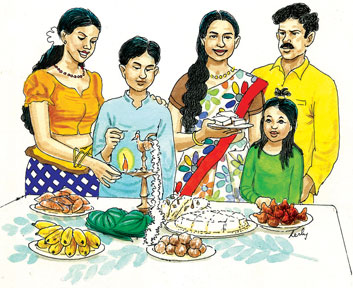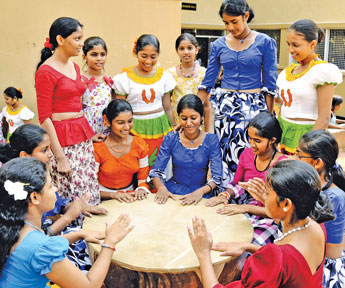Updated Avurudu
Sachitra MAHENDRA
 Before the year ends in a bash Before the year ends in a bash
Before the battery goes dead
Before the operators get busy
Before the SMSs are jammed
Wish you and your family
a prosperous,
glorious, exciting New Year 2010!
Can I stay here
In your inbox
And wait until midnight
So Iíll be the very first to
Greet you and wish you a
Happy New Year!
The greetings are becoming short, sweet and,
above both, innovative. But the traditional greeting card still carries
the nostalgic feel of a year gone by.
Much has been written on the Sinhala and Tamil New Year. Some
quarters may refer to history of the ceremony. Some may require
elaborating the importance. Some may take liberty to question the
validity of a traditional ritual in a commercialised society such as
what we are already witnessing.
While the majority tags along with the Sinhala and Tamil New Year,
the minority would station to question. This minority belongs to both
elder and younger generations. Questioning is admirable, and sometimes
looks quite an exceptional option. Majority does not question.
Groups and personalities
There are groups as well as personalities who criticize the Sinhala
and Tamil New Year. They would willingly make use of mass media for the
business. Then they expect some respect from the community for
unconventional thinking.
 |
|
A
traditional Avurudu Table filled with Avurudu sweetmeats. |
But does questioning alone do justice? Questioning the validity of
Sinhala Tamil New Year, in a way, shows ignorance of the bigger picture.
When we question, we indirectly think we are unconventional thinkers.
This indirectly makes us happy. Before questioning, we must reflect the
bigger picture.
Like in any other community, the Sinhala Tamil New Year exists to
unite people of different backgrounds and ideologies. A festival of such
a category is essential for humankindís survival. Naturally, a man is
pushed towards negative traits such as wrath and hatred. These traits
continue to pervade most human relationships throughout the year. The
festival has a potential to overweigh these negative traits by
freshening and smoothening relationships.
The soaps have often shown how wrathful families finally make amends.
The trend or customs may sound boring, as it rolls on every year without
much difference. But the human race needs such festivities for its own
survival. A day or two of friendship is much more worth than a whole
year spent in wrath.
Amid all hardships, man would finally reap his harvest. That usually
happens once a year. That certainly deserves celebration. Festivities
are born to celebrate harvests. The New Year, despite whatever changes
take place, may continue to grow. The festival depends on the usual
routine of its followers. Sri Lanka's evolution of the New Year offers a
good example.
Agrarian background
Sri Lanka was preliminarily an agricultural country. So the New Year
customs were mostly based on agrarian society. But with the British
arrival, the society experienced many upheavals. The New Year in the
same vein faced a cultural change. Like anything, it too has to face
evolution.
What is the better New Year? No one has the right to judge. The New
Year serves its purpose as the society wheels on with times. Many argue
that the New Year has become a trader's festival Ė commercialised, more
sophisticated in phrasing. Not only such phenomenon is inevitable, but
it is also a part of the deal that is evolution.
The society's needs have grown far beyond than it was a few decades
ago. There are certain points where it exceeds beyond the tolerable
level. The government had to increase taxes on cars, especially the
best-selling Indian brands, as the traffic congestion was getting worse.
When buying rate goes high, even beyond a tolerable point, it takes a
toll on the whole social system. The rulers have to hold against such
currents.
Evolution is what everything has to undergo. Festivals and ceremonies
are no exception.
In times of yore, the custom was to drop a one-cent coin to the well.
It bore many messages. The well used to be one source of income.
 |
|
Students of Ananda Balika Vidyalaya
playing Rabana during their school New Year
Festival.Pictures by Saman Sri Wedage. |
The residents used water to vegetation as well as their own purpose.
But things are different now. The well is becoming an antique item in
the urbanity.
A well could be dug in the garden to keep up with the tradition. For
some this may be a joke. For some this may be a good symbolic gesture to
keep with the tradition. For some this may just be ridiculous.
To dig the well or not, that is not the question. The question is if
we should accept and come to terms with evolution.
With evolution, customs have to change. This metamorphosis has quite
a few words: globalization, modernization and urbanization are beautiful
words.
Early days
We had no other source of water. So we had to respect the well. The
well was an important element, hence it had related customs. Now with
the pipelines flowing down beneath us, do we still have to adhere to
that particular custom? It doesn't mean we must cease respecting the
ancient water systems. But we too have to move on.
This is one example. When these customs cease, the questions and
criticism emerge. The New Year is losing its glamour, some can easily
opine. These opinions matter, and are relevant. The festivities may lose
their glamour. But who can expect glamour to continue every year without
difference? Seasons change. New discoveries unfold. If these come to
pass, how can only the festivities remain undisturbed? The New Year has
truly become the traderí festival, one may say, as they are the category
most benefited by the occasion. Saying so doesn't mean we must reverse
the situation. We simply cannot do that. We cannot reverse the grown up
human necessities. Our era is technologically advanced. But that does
not matter.
Many doubts have started surfacing.
This is merely one period we are passing. Many more things have
occurred, and are about to occur. With many arguments and questions
drifting through, what is left for us is to keep up with the tradition
that evolves with time.
|



